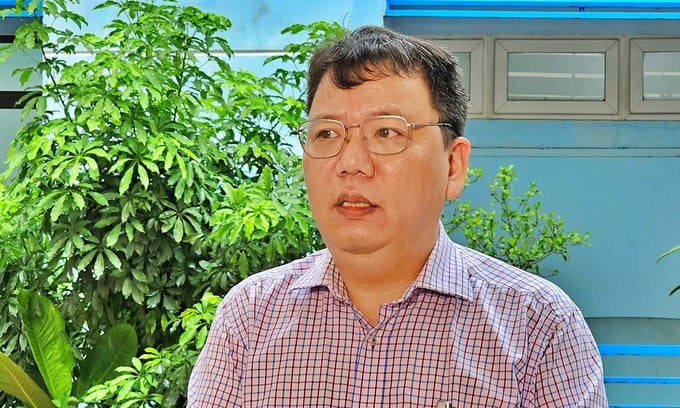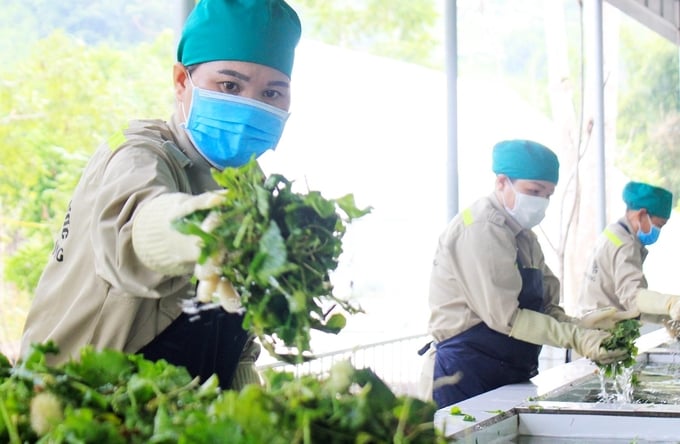May 30, 2025 | 08:19 GMT +7
May 30, 2025 | 08:19 GMT +7
Hotline: 0913.378.918
May 30, 2025 | 08:19 GMT +7
Hotline: 0913.378.918

Mr. Le Thanh Hoa: Improving the ability to implement SPS proves that Vietnam has kept up with the world's science and technology.
On June 19, the Prime Minister issued Decision 534/QD-TTg approving the Project "Improving the effectiveness of implementing the Agreement on the application of WTO SPS measures and SPS commitments within the framework of FTAs."
Mr. Ngo Xuan Nam, Deputy Director of the Vietnam SPS, assessed that the project helps all levels, sectors, and localities raise awareness and the ability to enforce SPS regulations, especially in the context of import markets. Continuously updated to improve quality, food hygiene, and safety. "If we do not carry out good supervision from raw material areas to processing facilities, we may be at risk of increasing the frequency of inspections for exported agricultural products," Mr. Nam said.
According to Mr. Nam, the number one priority activity of the project is to perfect the structure and organization of the SPS Vietnam. Along with that, is the expansion of specialized units. Previously, supporting the Vietnam SPS included 3 Ministries: Agriculture and Rural Development, Industry and Trade and Health. In the new project, responsibility also belongs to the Ministry of Natural Resources and Environment, Ministry of Science and Technology, Ministry of Finance, Ministry of Information and Communications, and Ministry of Foreign Affairs. In addition, it is the SPS focal point in 63 provinces and cities across the country.
Leaders of the Vietnam SPS said that adding ministries and branches to the project just approved by the Prime Minister will help the production area's inspection and review of input factors become more stringent.
"We have mostly only cared about the final product for a long time. If there is a problem, go back to the production process. In addition, some factors such as irrigation water, arable land, packaging standards... do not have a specialized agency to manage and supervise directly," Mr. Nam analyzed, adding that based on the new project, production areas must now not only meet VietGAP standards or equivalent but must also ensure hygiene and environmental friendliness.

Mr. Ngo Xuan Nam: For a long time, mostly only cared about the final product.
Based on the viewpoint of "standard input, the output will be standard," the Deputy Director of SPS Vietnam hopes that localities, industry associations, and businesses will be proactive and improve their role in the value chain. Also determined not to let the SPS regulations of the import market become a "barrier" to agricultural products.
In the long term, the Vietnam SPS will coordinate the building of the National SPS Information Portal. To do so, the Office connects the Ministry of Foreign Affairs and the overseas business system for early information and market forecasting. It is also recommended that the Ministry of Agriculture and Rural Development have programs to support human resource training or integrate training activities and improve SPS implementation capacity for localities into existing programs.
According to Mr. Le Thanh Hoa, in addition to the issue of information disclosure and transparency, the project to improve the effectiveness of SPS implementation is also a way for Vietnam to demonstrate to the world its ability to meet scientific requirements. Learn about hygiene and food safety. "Improving the ability to enforce SPS helps us have enough capacity and confidence to respond to other countries' opinions when they change related regulations," Mr. Hoa shared.
Vietnam currently participates in 19 FTAs. Tariff barriers for exports to key markets are almost gone, replaced by technical barriers. SPS regulations are considered one of them. If you do not understand and understand clearly, businesses may encounter risks such as: goods cannot be cleared through customs, returned, or even compensated for the contract.
More seriously, businesses' failure to comply with SPS regulations is also a basis for the importing country to evaluate and consider applying measures such as increasing the frequency of control or requiring a certificate from a competent authority.

Processing vegetables at the Quy Hop district agricultural cooperative, Nghe An province.
"SPS regulations are like a screening. Enterprises that qualify will integrate deeply into the international playing field. Otherwise, they will be eliminated," Mr. Hoa acknowledged and added that, in addition to SPS regulations, other Markets like the EU also have increasing demands on environmental issues, sustainable development, and labor.
Commenting that international standards will be increasingly improved, the Department of Quality, Processing, and Market Development leaders recommend that businesses prepare carefully before exporting. Besides updating information, we must continuously improve products and production processes... and innovate to perfect products at the highest level.
The project to improve the effectiveness of SPS implementation sets the goal of 100% of localities being able to strengthen the focal points for questions and answers on SPS regulations, and at the same time, 100% of food safety and animal and plant quarantine management officials at all levels are trained annually and updates on professional expertise.
8 tasks, 9 solutions and 10 priority activities are stated in the project. In particular, the Ministry of Agriculture and Rural Development has been assigned to build a National Information Portal on SPS measures, which is expected to be deployed from 2024 to 2025. In parallel, the Ministry of Agriculture and Rural Development will review, amend, and supplement Supplemental legal documents, national standards, and national technical regulations and assess conformity related to food safety management and animal and plant disease safety following international standards on SPS.
Translated by Huong Giang
/2025/05/25/4127-3-073637_820.jpg)
(VAN) Thanks to the promotion from an FAO-implemented project, vegetable production in greenhouses in Moc Chau has seen strong development, from 1.5 hectares in 2021 to nearly 50 hectares in 2024.

(VAN) FAO has recently supported USD 140,000 to implement the project 'Risk mitigation human-animal interface risks through disease control initiatives in pig farming.'

(VAN) The People's Committee of Tra Vinh province has approved an adjustment to the investment policy for the Green Hydrogen Plant project, increasing its area to approximately 52.76 hectares.
![Reducing emissions from rice fields: [2] Farmers’ commitment to the soil](https://t.ex-cdn.com/nongnghiepmoitruong.vn/608w/files/news/2025/05/05/dsc08881jpg-nongnghiep-140632.jpg)
(VAN) Clean rice cultivation model in Thuong Tan commune, Bac Tan Uyen district, is assisting local residents in achieving sustainable agriculture by substantially reducing costs, increasing productivity, and protecting the environment.

(VAN) At the conference to disseminate Resolution No. 68, AgriS introduced its digital agricultural ecosystem and reaffirmed its commitment to accompanying the Government in promoting private sector development and sustainable agriculture.

(VAN) 'Blue Ocean - Blue Foods' initiative is designed to restore marine ecosystems and establish sustainable livelihoods for local communities by cultivating a minimum of 1,000 hectares of cottonii seaweed in the first three years.
/2025/05/21/4642-3-112707_603.jpg)
(VAN) The V-SCOPE project has made direct contributions to three out of six pillars of the Comprehensive Strategic Partnership between Vietnam and Australia.